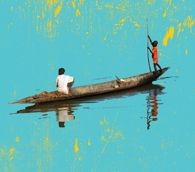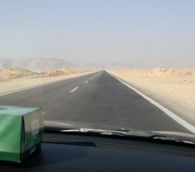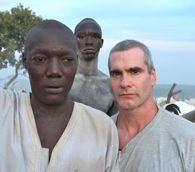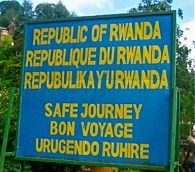Destination: Africa
Kidnapped Writer Michael Scott Moore Released in Somalia
by Eva Holland | 10.21.14 | 7:05 AM ET
It’s been more than two and a half years since Michael Scott Moore, the writer best known for the surf book Sweetness and Blood, was abducted in Somalia while reporting on piracy there. Late last month, he was finally released and sent home.
Moore is a World Hum contributor and a past interview subject. He has yet to speak or write publicly about his ordeal, but Outside has taken a long look at his captivity and broader debates about how best to respond to kidnappings for ransom.
Needless to say, we’re relieved he’s been freed.
Fly Girl
by Abbie Kozolchyk | 08.30.13 | 10:17 AM ET
Even though she was a visitor to Uganda, Abbie Kozolchyk turned out to be the perfect host
See the full audio slideshow: »
AFAR Goes to Coffeeland
by Eva Holland | 04.25.13 | 8:58 AM ET
In the latest AFAR, longtime World Hum contributor David Farley goes to the world’s caffeine heartland: Ethiopia. Here’s Farley:
Coffee is to Ethiopia what hops are to Bohemia or grapes to Bordeaux. That is, coffee is almost everything, from the cornerstone of the community’s economic fortunes to the lifeblood of its social relations. Java drinking is so deeply rooted here that Azeb was dumbstruck that I could have lived 40 years on the planet never having seen what coffee looks like before it’s plucked, peeled, dried, roasted, and ground.
Which is exactly why I was in Ethiopia. I wanted to travel around this East African country’s primary coffee-growing regions and immerse myself in its coffee culture. I can sit around at coffeehouses in New York and San Francisco drinking all the Ethiopian coffee my brain can take before spinning out of control. But I was curious about the time and toil it takes to produce these beans, everything that goes into slaking the States’ obsessive thirst for small-batch artisan roasts.
Headed to Coffeeland yourself? Check out our primer on how to take part in an Ethiopian coffee ceremony.
R.I.P. Chinua Achebe
by Jim Benning | 03.22.13 | 10:49 AM ET
The celebrated Nigerian writer has died at the age of 82.
He was best known for his novel “Things Fall Apart,” which is about the clash of traditional Nigerian culture with the arrival of bibles and British colonial rule. When the novel turned 50 in 2008, Frank Bures reflected on its impact and the world Achebe evoked.
The publication of “Things Fall Apart” is often cited as the birth of modern African literature, and since its publication the book has sold some 11 million copies in 50 countries.The Chronicle of Higher Education wrote that for Americans, is it “the quintessential novel about Africa.” In fact, it is the foundation of tens of thousands of college students’ introduction to the continent, and forms many of our ideas of the place even today.
That’s fine, and I realize that “Things Fall Apart” is required reading. But as important as it is, “Things Fall Apart” is a novel of the past. Since then Africa has changed so much and so fast that the amalgam of the world Achebe wrote about and the one we see today can be hard to recognize. These days, there are so many other great novels coming out that reflect the Africa of today: “Graceland,” “Waiting for an Angel,” “Purple Hibiscus,” and on and on.
The Lower River
by Paul Theroux | 06.05.12 | 9:36 AM ET
An excerpt from the new novel by Paul Theroux
Detained in the Sahara
by Bill Donahue | 05.30.12 | 9:47 AM ET
It was night. Soldiers ordered Bill Donahue from the vehicle. Would they administer primitive justice?
A Reunion in Arusha
by Eva Holland | 03.12.12 | 8:13 AM ET
More than eight years ago we published Test Day, Frank Bures’ story about teaching English in Arusha, Tanzania, in the mid-‘90s. Now, the Washington Post has Frank’s thoughtful story about his long-awaited return to Arusha. Here he is exploring the town after more than 15 years away:
When I got downtown, I spent several hours wandering around. The lepers who used to beg by the river had been kicked up the road by trinket vendors. The library was still a sorry, run-down affair, filled with books on Dianetics and other irrelevant subjects. The “Modern Supermarket” had evolved into a liquor store. The Metropole Bar and Restaurant was now the “House of Burgers.” People, in general, had gotten fatter, and they had cellphones. Hotels were going up everywhere. The clock tower by the post office actually worked—and was sponsored by Coca-Cola. The Air Tanzania office was open, but the company’s two planes were broken.
From time to time, as I walked around, waves of memory and sadness washed over me. Where were all the people I knew? Arusha was a big town, but not that big. It felt as though I had been forsaken by an old friend. I hadn’t even lived in Arusha that long—just over a year. An Italian acquaintance had told me at the time: “A year is like a breath.” But it was a deep breath, and things were never quite the same after I exhaled.
In the story, Frank reunites with some of his former students, now adults and members of Tanzania’s growing middle class. “Test Day” has always been a favorite of mine in the World Hum archive, so it was a pleasure to read about their lives today.
The Concerto Inspired by Tahrir Square
by Jim Benning | 01.25.12 | 6:12 PM ET
Arab American composer Mohammed Fairouz watched the uprising in Tahrir Square on TV a year ago today. As he looked on, with the volume off, he began composing a piece of music. “Tahrir for Clarinet and Orchestra,” now complete, is “the first movement of what will eventually become a concerto in three movements,” according to a fascinating report on PRI’s The World.
You can hear the movement in its entirety below, but the radio segment is well worth a listen, particularly Fairouz discussing the various facets of the uprising he was trying to evoke through the music.
Interview with Henry Rollins: Punk Rock World Traveler
by Jim Benning | 11.02.11 | 12:40 PM ET
Jim Benning asks the musician about his new book of photographs and how travel has humbled him
‘I Was Writing a Guidebook to a Country That No Longer Exists’
by Michael Yessis | 10.10.11 | 9:08 AM ET
Kate Grace Thomas updated the Lonely Planet guidebook to Libya just before the Arab Spring. As the country turned violent, the book was quickly put on hold. Yet Thomas found herself itching to return to Libya. She writes about her experiences in Guernica:
War is not my beat. I knew that. But Libya, somehow, was. I went in December to tell its stories—stories of nascent tourism and marvelous ruins, stories of deserted beaches and drinking sugary tea in the winter wind. And now, there were more stories to tell.
(Via @writinginpublic)
Of Laws and Loopholes
by Christopher Vourlias | 09.07.11 | 10:32 AM ET
Christopher Vourlias just wanted to cross the border, but one man stood between him and the Congo
David Brooks on Travel and the Haimish Line
by Jim Benning | 08.30.11 | 4:32 PM ET
The New York Times columnist recently took his family on safari to Kenya and Tanzania. They stayed in simple camps where they got to know people and more luxurious camps where they did not.
The more elegant camps felt colder. At one, each family had its own dinner table, so we didn’t get to know the other guests. The tents were spread farther apart. We also didn’t get to know the staff, who served us mostly as waiters, the way they would at a nice hotel.
I know only one word to describe what the simpler camps had and the more luxurious camps lacked: haimish. It’s a Yiddish word that suggests warmth, domesticity and unpretentious conviviality.
It occurred to me that when we moved from a simple camp to a more luxurious camp, we crossed an invisible Haimish Line. The simpler camps had it, the more comfortable ones did not.
Brooks goes on to extrapolate larger lessons about how we live. It’s a well-worn theme in travel—see Rick Steves and a thousand other sources. But the message never gets old, undoubtedly because most advertising continues to insist we’ll be happier if we just spend more money.
Tunisia Tackles Tourism Shortfall with Dark Humor
by Eva Holland | 07.14.11 | 5:49 PM ET
Tunisia’s role in the Arab Spring wasn’t as widely reported as, say, Egypt’s or Libya’s. But word about the country’s revolution has still spread far enough to cut tourism in half—and the Tunisian authorities are hoping to regain some of that lost revenue through a series of ads poking fun at the unrest.
According to the Guardian, one ad shows a woman enjoying a massage under the caption, “They say that in Tunisia some people receive heavy-handed treatment.” Another depicts an ancient archaeological site, with the tag line, “They say Tunisia is nothing but ruins.”
Tasteless? I suppose if I was a Tunisian civilian who’d been shot at or abused by police during the uprising, I might not be amused. But I think tackling a country’s reputation head-on is a good thing—and hey, as Australia learned a few years back, a little controversy can go a long way.
Rapping About Travel in Kenya, Mzungu-Style
by Jim Benning | 06.08.11 | 3:03 PM ET
Afar magazine sent filmmaker Jorma Taccone to Kenya, where he co-wrote a travel-related song with a Nairobi rapper named Rabbit and shot a video. Considering its mzungu origins, it’s not half bad.
Protests in Egypt: Five Links for Travelers
by Eva Holland | 02.03.11 | 3:14 PM ET
The protests in Egypt are entering their second week, and the flow of news stories, blog posts, links, tweets and video can be overwhelming. Here are five links, in case you’ve missed any of them:
- The AP has a round-up of the government travel warnings and cruise and tour cancellations that began cropping up late last week.
- Reuters has coverage of the evacuations of foreign nationals that began earlier this week.
- Al-Jazeera English has been live-blogging daily from Cairo, Alexandria and Suez—a must-read.
- Andrew Sullivan’s The Daily Dish is another good resource.
- Finally, The Atlantic has a really well-done video compilation of the early days of the protests.
- « Prev Page
- Next Page »




